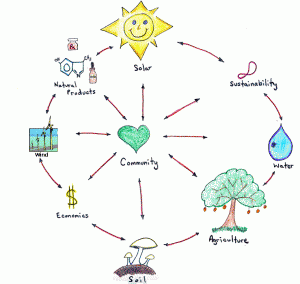
Image Source: http://www.rnl3.net/ILSDWeb/images_videos/Drawings/Relationships__2.gif
Each component of the global food system depends on a healthy planet. What is a healthy planet? It is not just the absence of air pollution, global warming, landfills, deforestation, oil spills, etc. A healthy planet, and therefore a healthy global food ecology (socially, politically, environmentally) also boils down to healthy dirt, nutrient-rich soil and water, microbial symbiosis… all sorts of teeny tiny living, breathing parts.
Industrialized farming and livestock production has caused widespread soil degradation. Erosion, depletion of nutrients, loss of natural vegetation, and diversion of water create problems not only on that particular farmland, but worldwide. A soil health decreases, fresh water systems are affected; aquifers do not replenish, excess water runoff creates floods and biochemical imbalances. Dust bowls and droughts occur, and those arid landscapes exacerbate climate change.
What about the other end of the spectrum; us? Not only does our ability to farm the land get challenged, social and cultural systems suffer. Political climates are challenged as are international relations. Agricultural scientists have new challenges as once a focus was on maximizing the efficiency of fertilizers and soil profitability, now there is a focus on finding the right types of seeds to survive on their own in the damaged environment. We are even engineering new plant genomes. How will these organisms affect the future health of soil and water?
